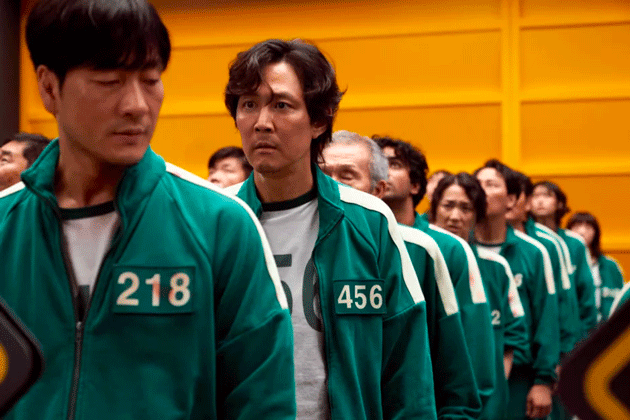Squid Game, the South Korean survival drama that took the world by storm since its release in late September 2021, has officially become Netflix’s most-watched show ever with a viewership of over 110 million. The nine-episode series, directed and written by Hwang Dong-hyuk, revolves around a life or death game show where debt-ridden contestants compete in a variety of different children’s playground games for a 45.6 billion-Won cash prize (41 million USD). Squid Game is not the first South Korean drama exploring themes of economic inequality to have a global impact, with Parasite, directed by Bong Joon Ho, becoming the first non-English film to win Oscar’s Best Picture 2019 and gaining widespread recognition from both film critics and mass audiences alike.

Squid Game offers a brutal reflection on the growing economic insecurities and class inequalities that affect not only South Korea, but the entire globe, bringing light to the United Nations Sustainable Development Goals #1: End poverty in all its forms everywhere. The show follows the protagonist Seong Gi-Hun, an estranged father with a gambling addiction who has signed away his kidney as collateral for the loan sharks he is indebted to. Gi-Hun is recruited, along with other low-income and low-social status folks in similarly desperate situations to participate in the Squid Game.
The storyline of the show serves as “an allegory for modern capitalist society, something that depicts an extreme competition, somewhat like the extreme competition of life,” Hwang explains in an interview with Variety Magazine.
This notion is reflected in the bed design in the show as well, with Art Director Chae Kyung-Sun describing how the bunk beds players sleep in while participating in the games are intentionally arranged to resemble stairs to portray how “modern society is in constant competition to climb the ladder” in an interview with Netflix Korea.

The anonymous organizers behind the Squid Game present themselves as benevolent gods, providing a once-in-a-lifetime opportunity out of the deeply shackled pit of economic debt that would never be offered to these people otherwise. “Do you want to go home and live the rest of your life like garbage, being chased by creditors?” an anonymous organizer asks the participants in the first episode, reminding both them and the audience that while the realities of the Squid Game are horrific, the unforgiving world they left behind offers no protection either.
Instead, the games offer something no longer accessible in the outside world - socioeconomic mobility and equality of opportunity.
With the prize money, the winning player has an opportunity to pay off their debt and begin their lives again with a comfortable cushion. In a twisted way, the organizers of the games actually attempt to subscribe to the principles of the United Nations Sustainable Development Goals #10: Reduce Inequality Within and Among Countries, emphasizing equality and fairness as non-negotiable cornerstones of the game’s principles, with infringement on these principles being severely punished, as explained by the Front Man.
Yet, this subscription is ultimately misguided from its conception, with the division in roles between the organizers, the guards, and the players mirroring the class inequality found in the outside world, as South Korea harbours the fastest-growing income gap in the world with the top 20% earning 166 times more than the bottom 20%. The art direction of the show visually brings out this inequality, as with the contrasting colours of green and pink throughout the set and costume design reflecting the contrasting statuses between the players and the organizers.
Hwang conceived the idea for Squid Game thirteen years ago, but was unable to get the show off the ground because the storyline was deemed too bizarre and detached from reality. In today’s social and economic landscape, however, the concept of the show appears much more relatable and convincing, as reflected by the overnight success of Squid Game. While South Korea is the world’s most educated society, with 70% of 24 to 35-year-olds attaining post-secondary education, a degree and a steady white-collar job no longer offer the financial security it once used to - a growing reality all over the world.
The show takes inspiration from South Korea’s growing household debt crisis, the highest in the world, which is now equivalent to over 100% of the country’s GDP. The household debt crisis is the result of many combining factors, including rising housing prices, growing youth unemployment rates, and a lack of regular, long-term job opportunities. The rise in household debt has resulted in a vicious cycle, whereby people are increasingly taking out loans in order to pay off debts, causing one in ten South Koreans to spend essentially all of their monthly income purely on loan payments. The crisis has affected the elderly and young people the most, with young people becoming the fastest-growing bankrupt demographic in South Korea. As a result, debt, as well as the shame that accompanies it, has become the driving factor for suicide among nearly every age group in South Korea.
The game’s organizers push forth the idea that the Squid Game is a refuge from the unequal and discriminatory system found in the society - one that is characterized by lower-class oppression for the pleasure of the upper class. In actuality, the players are simply shuffled from one oppressive system to another without any meaningful change to their status or roles within that system. For the players, this is the last chance they have to make something of their lives, while for the organizer and their VIP friends, the Squid Game is just some good old-fashioned entertainment - like the Olympics or the Emmys. They sit around on lavish couches with drinks, placing bets on players, and providing superficial comments about the horrors going on on the other side of the glass as a spectacle for their enjoyment - which it is. The glass plays a symbolic role as not only the division between two classes or two worlds, but also as the division between the subject and the object, and the asymmetry of power between them.

Within this context, players are not people, but things that serve a purpose: to entertain. When their impending death ceases their ability to perform, their bodies are either burned or subjected to organs harvesting. Thus, even after completing their primary purpose, the players’ bodies are broken down into smaller parts and repurposed yet again, like a used car. The dehumanization of the players is emphasized by their uniforms, which are identical except for their identification number. Additionally, Squid Game’s Art director Chae Kyung-Sun discusses in a recent Netflix Korea interview how the sleeping area was inspired by the idea of a warehouse, with the players taking on the role of the products stacked on the shelves.
When Gi-Hun asks the “Front Man” the reason for the Squid Game following his victory and exit from the games, he’s met with a simple answer: “You like horse racing right? You people are horses”. Thus, it becomes clear that the “equality” in the Squid Game arena was meant to reflect an egalitarian society, but rather existed to enhance the entertainment for the VIPs - to make the games more unpredictable and fun to watch.
Ultimately, Squid Game is “a story about losers -- those who struggle through the challenges of everyday life and get left behind, while the winners level up,” explains Hwang in an interview with CNN. I would argue that Squid Game is also a story about people - people whose lives are deemed valuable, whose aren’t, and why.
Stream Squid Game today on Netflix, available in 190 countries.
